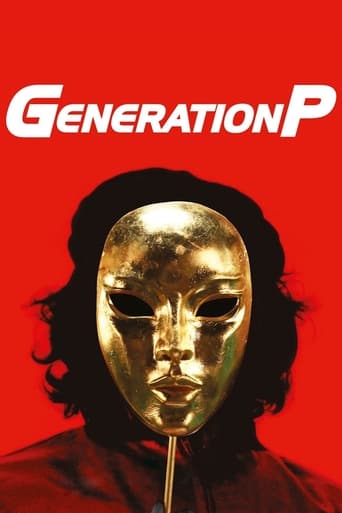Lee Eisenberg
Viktor Ginzburg's "Generation P" is a satire on advertising, and the free-for-all that took over Russia after the Soviet collapse. My favorite scene is where the main character imagines Che Guevara showing him how mass consumerism destroys the soul and turns one into a robot watching TV all day (like the characters in Mike Judge's "Idiocracy").A lot of the movie is filmed so that the audience isn't sure if the action is real or imagined (those mushrooms suggest the latter). And then there's the title. The P could stand for pop, Pepsi, Panasonic, or something else of that ilk. Empty prospects for the generation that saw Boris Yeltsin shell the parliament building that he had previously defended, and then use the constitutional crisis to establish a nearly monarchical government.I recommend the movie. The main character's immersion in one of the sleaziest worlds of all makes for an intense story. Really good one.
karen-821-938620
It might even be better if you haven't read the book, but come in naively as I did and just start watching with no expectations. Although this work of magical realism has a strong Russian flavor, it is as much about western civilization as anything else. Ironically, one of the themes is that Russia produces no products, but the Russian pose has long been that it produces philosophical literature and this Certainly qualifies. It also gives you a big taste of Russia that will inform someone who knows very little. The "cultural references" may be specific, but the context usually gives you an idea of what sort of thing is being referenced. I look forward to forcing my husband to watch it with me, and I wish I had more time to read, because the book must be really good...Now that I have seen it again, I look forward to reading the book, preferably annotated. A second viewing means that you can catch more foreshadowing and thematic development. I realized I had missed a few plot points, too. The events of 2015 resonate strongly with this film and it looks like 2016 will be more resonant yet. This film is available on Google, and I can't recommend it enough. From prehistory to modern politics it has something to say. It is funny as hell about some serious stuff.
hte-trasme
"Generation P" is one of those books that is fantastic as a prose work and that one never suspects could be adequately filmed for a movie. The makers of the cinematic version clearly knew how ambitious they were being, working with this source, a lot of money and a lot of anticipation. The result is very, very good. But it doesn't capture some areas of where the source shines, while being very closely drawn from it and so inviting comparison. It looks fantastic, both in terms of the creation of a fantasized nineteen-nineties within the look of physical objects and costumes in the film, and in the realization of excellent visual imagery to represent some of the less literal matter going on. As a film, it's well timed, well edited, and well scripted such that it moves at a quick pace and is frequently insightful. But one of the strengths of the source novel was its willingness to philosophize at length, and to delve into its hallucinogenic descriptions. The film, in its desire to adapt the whole book, films a lot of events without the accompanying matter than justifies their inclusion. Thus, I think they miss a lot of the most important and worthwhile matter of the novel. We see Babylen eating hallucinogenic mushrooms and later LSD, but we only skim over the effects of them. We see how he runs into Blo at his new job, but we have no time to be introduced to who Blo is. We see that Yeltsin is being 3-D modeled and get some satiric value from that, but we don't get the full explanation that makes the idea so important and powerful. Most importantly, we hear the hallucination of Che Guevara speaking, but he gets only a few lines spoken very quickly, and we almost miss the discussion (deeply emphasized in the book) of the three human impulses -- oral, anal, and wow -- and how they relate to commercialism. Missing the emphasis on that feels like missing the point somehow. They kept (sometimes line for line) the novels satires of commercials, but not of commercialism -- and therefore made the work considerably less potent. I read that several firms were ironically given product placement in order to help finance the film; I hope that didn't affect any editorial decisions to weaken the message. Overall quite an impressive film, but one that invites comparison with the source, and then fails to capture its spirit or satiric power in several key areas.
Constantine
If you have read the book, then you will like that movie did not tried to "improve" or "rethink" the original story, but stayed quite close to original, sometimes quoting parts of the book's text entirely.Cast is fine. Don't let the sucky trailer full you, actors are playing fine and their characters are quite believable (except for maybe, Litvinova, but she has around 30 seconds on screen, so it does not matter).Visuals are good. Not great, but good. Its "slightly better 90s", with slightly more human bandits, and slightly cleaner streets.Sound is fine, and music is even good enough to wonder about buying a soundtrack... but. There is always "but", and in this case - you MUST have lived in ex-USSR 90s, and you must speak Russian, to understand the movie. It's very tightly rooted into post-soviet discourse, and without "cultural references" (c), i am afraid, the movie will be hard to grasp on.alternatively, if you have ever wondered about, or experienced altered states of consciousness, you might find it fun ;)


